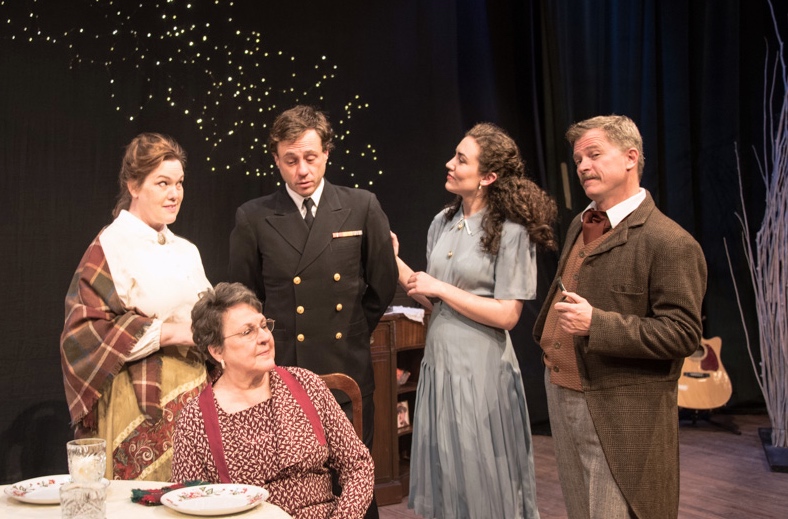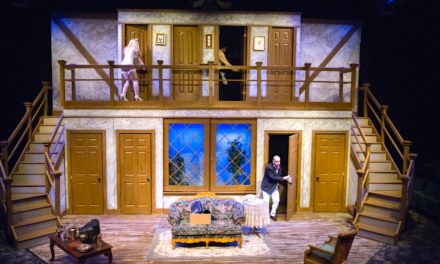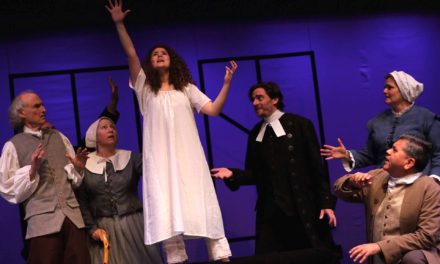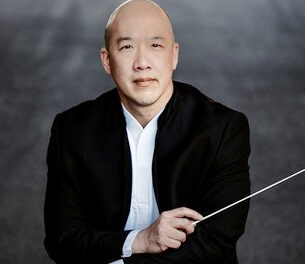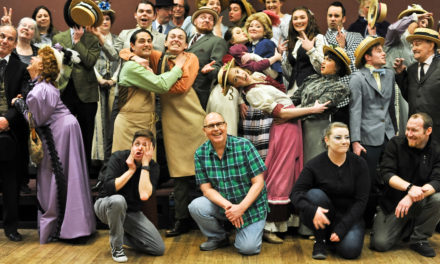(Above: Christina Scott, Sharon Wetterling, Steven Shipman, Phoebe Gildea and Allen Hambrick in The Long Christmas Dinner at The Very Little Theatre; photo by Richard Scheeland)
By Kelly Oristano
My favorite Christmas moment almost every year happens at the Christmas Eve service at First Christian Church. All the lights are turned off, and we stand around the border of the sanctuary with unlit candles singing Silent Night as one lit candle is passed around the big circle. By the end of the song, everyone is standing in a ring of candlelight that we’ve created by sharing. It’s incredibly touching and it’s a brilliant wordless reminder of “Why Christmas?” Winter is dark, and cold, and for many of us lonely or sad. This shared candlelight is our reminder that we’re not going through anything alone, that our chosen community multiplies and reflects our light back at us, and that we are participating in a timeless but linear tradition aimed at renewing our lives in the new year.
Thornton Wilder’s The Long Christmas Dinner, now playing at The Very Little Theatre’s Stage Left, as adapted and directed by Rebecca Lowe, is a similarly saccharine-free Christmas entertainment, an acknowledgement of and a bulwark against the dark, the cold, and the alone of winter. The theater has the feeling of a Ritual Space from the moment one enters. A lovely starscape adorns the walls and floats below the ceiling over a luscious antique dining room set. The mood is reverent, if not somber.
Lowe’s adaptation takes the form of the inclusion of 20 or so Christmas carols and poetry excerpts, recited and sung by the cast with accompaniment from violins, cellos, guitars and flutes under the direction of Sofia Dumitru. The first half of the entertainment is labeled “Christmas Eve” in the program and consists entirely of carols and poems. The carols tend toward the serious and traditional. The most modern is White Christmas, placed near the end to remind us how far we’ve come. One is free to imagine the Bayard family (though we’ve not met them as such yet,) having a long, inter-generational wassail to hold off a cold December 24th.
With no intermission, we move into “Christmas Day” and into Wilder’s play proper, though more carols and readings will be interspersed among the dialog. For a play written in 1931, it’s deeply experimental even before the addition of music and poetry.
The Dinner in question takes place at one table on many of the Christmases over about a hundred years. Early scenes feature Civil War-era generations of the Bayard family, sitting down to turkey and stuffing (and plenty of wine), discussing the start of a Bayard family business, the need for upkeep on the old Bayard estate, and Mother Bayard’s Christmas memories of even longer ago.
Soon a character called “Nurse” pushes in a pram, and we are introduced to the next generation of Bayards. In a later scene we see this baby as a grown-up, as time passes magically on this eternal Christmas night. By the end of the dinner, there’s still turkey and stuffing and wine, but we’ll have advanced to around the World War II era, and Bayard family factories dot the skyline, although that’s as much a problem for the Bayards as it is progress.
But when dinner takes a hundred years, it can’t only be babies entering from one side of the stage. Early on, Mother Bayard excuses herself from the table and exits through a bough of white branches. The dialog of the remaining family reveals that Mother Bayard is gone. Many more characters will leave through this bough over the course of the meal. It’s touching and sad and heavy. After a character makes this portentous exit, their loss is often felt by the characters left on stage. And it’s not just the elderly who pass through, either. The play is shockingly realistic and dispassionate about who will and won’t pass through this portal.
The large cast is good and the music is heartfelt and warm. Steve Mandell and Allen Hambrick are especially fine as the family’s two patriarchs. Marcee Shriver Long is enchanting as the Nurse, bringing in new Bayard after new Bayard with great joy and moving time forward with the snap of a finger and a well-placed light cue. You have to understand Nurse to understand the story; fortunately Long makes that easy. Hambrick, Phoebe Gildea, Tom Laird, and Elizabeth Grieve give notably strong musical performances.
The set by Lowe and costumes by Chris Carter are rich, real, and gorgeous. Stage Left has never looked lovelier.
It’s frankly a dicey proposition to mount a Christmas entertainment of this nature, one that is unabashedly serious and does not hide from the dark side of Christmas as a method of reminding us what the light of Christmas is. And being honest, it’s accomplished in this instance with varying levels of success across the evening. But the thing at the heart of it, the light we all share against the darkness, is real and thoroughly felt, and remains with me now, days after leaving the theater.
The Long Christmas Dinner
When: Continues evenings at 7:30 p.m. on Dec. 6-8 and 13-15; matinees at 2 p.m. on Dec. 9 and 16
Where: The Very Little Theatre, 2350 Hilyard St., Eugene
Tickets: $15 general admission, available at the box office, 541-344-7751, from 1:30 p.m. to 5:30 p.m. Wednesday through Saturday or online at TheVLT.com

